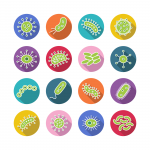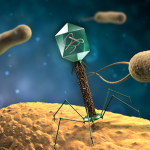Antibiotic resistance is a crisis. One of the driving forces is that the drugs are overprescribed by primary care physicians. Although there are efforts to minimize the unnecessary antibiotics being given to those who don't need them, a new study shows that they're just not working.
antibiotic resistance
When it comes to finding new antibiotics, no place is too weird to look. Three separate teams of researchers have identified potentially useful antibiotics from some of the strangest places imaginable: Sponges, sea snails, and marine worms.
In the battle against antibiotic resistance, here's an interesting proposal: salted doorknobs [in hospitals, or elsewhere] could fight super bug infections. Intrigued? So are we. Bummed you didn't think of it first? So are we.
The World Health Organization released its first-ever report on the antibiotic resistant bacteria that are of the greatest concern: the global priority pathogens. With roughly two million cases of antibiotic resistant infections each year in the United States – and 23,000 deaths – we need to pay attention to this.
A team of German researchers swabbed 400 bathroom door handles from 136 airports in 59 countries. More than 5 percent produced strains of Staphylococcus aureus, a result that underscores the importance of proactive global epidemiological surveillance. There is no such thing as local outbreak anymore.
With antibiotic resistance a growing threat, scientists are on the hunt for new ways to treat bacterial infections. One of these, called phage therapy, uses a special kind of virus that only infects and kills bacteria.
Over-prescription of antibiotics for non-bacterial illnesses contributes to the overuse of these drugs and to antibiotic resistance by the bacteria — a real threat to human health. Some preliminary research suggests that testing for CRP might help decrease the rate of overprescription.
With the recent discovery of polymyxin-resistant infection here in the U.S., there's a renewed pledge among drug developers and the government to incentivize research for developing new antibiotics, previously a seemingly abandoned effort.
Dr. David Shlaes, my former colleague at Wyeth, is one of the world's premier experts in antibiotic research and development. He and I have co-written an opinion piece entitled "Stop Giving Antibiotics to Cows, Pigs, and Chickens Now," that was just published in STAT- the online science site of the Boston Globe. This issue is both timely and critical.
Dame Sally Davies, Britain's chief medical officer, has written to pharmacies and GPs warning them to use correct medical practices when treating the sexually transmitted bacterial infection gonorrhea, but too late Somehow, the UK ended up getting three years behind us in treating the infection properly. This is no laughing matter. Thanks to bacterial resistance, we are now down to one drug that still cures the infection. Misusing it, as was done in the UK, will accelerate the resistance problem, and could leave us with no options to cure a very common STD.
The battle of medicine vs. bacteria has been going quite poorly for more than two decades, primarily due to antibiotic resistance. The last thing we need is giving these bugs another edge. But in China, a newly-discovered gene can spread to many types of bacteria, and render useless some antibiotics that are our last line of defense against unresponsive infections.
Some new, alarming information from the World Health Organization shows that we need a better understanding of how to correct the problem of antibiotic-resistant infections in humans. A large, multi-country survey revealed widespread confusion of how antibiotics should be used.




